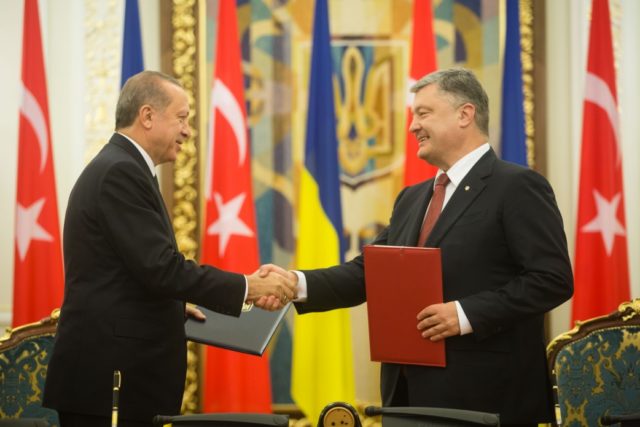
Turkey Gives Symbolic Political, Military Support to Ukraine
Publication: Eurasia Daily Monitor Volume: 16 Issue: 7
By:

Turkey and Ukraine are boosting their strategic cooperation in the military sphere. Last week (January 12), Ukraine’s President Petro Poroshenko stated that he signed an agreement on the purchase of 12 Turkish Bayraktar Tactical Block 2 (TB2) unmanned aerial vehicles (UAV) for the Ukrainian military (Hürriyet, January 12, 2019). The continued growth in bilateral military cooperation has attracted renewed attention since the “Kerch Crisis,” which arose between Ukraine and Russia on November 25, 2018. On that day, Russian naval and maritime border guard forces attacked several Ukrainian naval ships in the Black Sea, damaging and capturing the three vessels and their crews (see EDM, November 26, 28, 2018).
Naturally, Ankara has viewed the Kerch Crisis with alarm, considering the negative impact it has on regional Black Sea security. As such, Turkey has encouraged both sides to focus on diplomatic talks to quickly resolve this issue and has expressed readiness to act as a mediator between Russia and Ukraine. Within days of the incident, on November 28, Turkish President Recep Tayyip Erdoğan spoke on the phone with both Vladimir Putin and Poroshenko. Discussing the escalation of the situation between Moscow and Kyiv, he stressed the importance of a diplomatic solution. Erdoğan also said that Turkey supports talks in the Normandy format, between Russia, Ukraine, France and Germany (Sputnik—Turkish edition, December 2, 2018). More recently, the leader of the Crimean Tatars (a Turkic ethnic group that has for centuries inhabited Crimea), Mustafa Cemilev, said in an interview to Ukrinform that Erdoğan backs Ukraine’s position on the freedom of navigation in the Kerch Strait (Ukrinform, December 31, 2018).
Meanwhile, the Kerch Crisis has raised an uncomfortable question for Turkey and other Black Sea actors: Namely, should one now regard Russia and Ukraine as locked in an open conflict?
Immediately following the incident in and around the Kerch Strait, the president of Ukraine declared martial law but allowed it to expire a month later—on December 26 (see EDM, December 12, 2018). Whereas, the commander of the Ukrainian Navy, Ihor Voronchenko, said that Kyiv wants to push for the closure of the Turkish Straits to Russian ships (YeniÇağ, November 29, 2018). Article 20 of the 1936 Montreux Convention states, “In a time of war, [with] Turkey being a belligerent… the passage of warships (through the Turkish Straits) shall be left to the discretion of the Turkish government.” Pointedly, the government in Ankara made no public statements in response to the exploratory demands coming out of Kyiv regarding the closing of the Straits. Nevertheless, a couple weeks after these events, the Turkish Navy announced it had begun construction on a new naval base in Trabzon, in the eastern part of the Black Sea (Milliyet, December 11, 2018).
In an effort to further focus international attention on the volatile security situation in the Black Sea region and its possible long-term negative implications, Ukraine, together with Bulgaria, Canada, the Czech Republic (Czechia), Denmark, Estonia, Finland, France, Georgia, Germany, Latvia, Lithuania, the Netherlands, Poland, Romania, Slovenia, Sweden, the United Kingdom and the United States, submitted a draft United Nations General Assembly resolution on “The problem of militarization of the Autonomous Republic of Crimea and the city of Sevastopol (Ukraine), as well as parts of the Black Sea and the Sea of Azov.” Turkey supported Ukraine’s initiative. And on December 17, the UN General Assembly adopted the resolution, urging the Russian Federation to withdraw its forces from Crimea and expressing grave concern about its rising military presence in the region (Un.org, December 17, 2018).
Despite the temporary freezing of some multilateral cooperation formats in the Black Sea as a result of the Ukrainian-Russian tensions, Ankara and Kyiv continue to cooperate within the Black Sea Naval Co-Operation Task Group (BLACKSEAFOR). Additionally, Turkish marines took part in last year’s Sea Breeze 2018 exercise, hosted by Ukraine, along with military units from the US, UK, Moldova, Bulgaria, Romania and other Western countries (Korrespondent, July 21, 2018).
Economic relations between Ukraine and Turkey are also improving. Turkish businesses invested around $6 billion (159 projects) in Ukraine last year. And in only the first five months of 2018, about 380,000 Ukrainian tourists visited Turkey. Currently, the two countries are working together on a free trade agreement, with a goal to reach an annual trade turnover of $10 billion (AA, October 26, 2018).
Turkey’s position on the Crimean issues remains clear: Ankara officially does not recognize the Russian occupation of the peninsula and supports the sovereignty of Ukraine in all international platforms. As for the aftermath of the Kerch Crisis, Turkey notably did not ultimately take up the role of an impartial mediator between Russia and Ukraine. Instead, Ankara has extended its support for Ukrainian initiatives in the UN General Assembly regarding defending the status of the free passage of all vessels through the Kerch Strait. In this way, Turkey is trying to balance Russia in the Black Sea region by, in part, supporting Ukraine’s security and territorial integrity.



